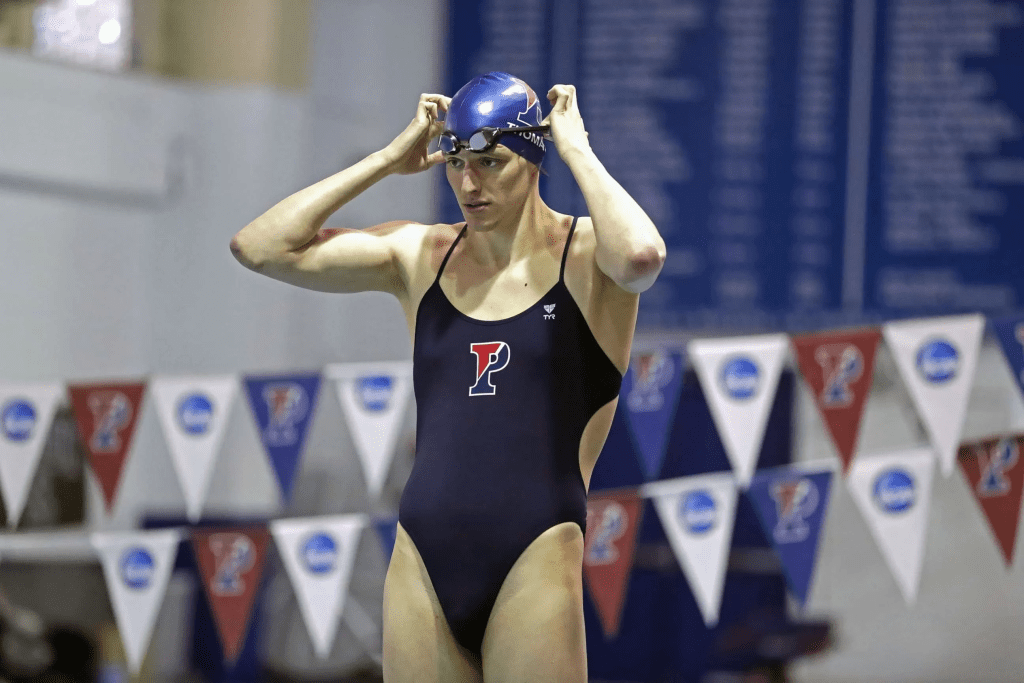
In a groundbreaking and controversial move, the NCAA has officially stripped Lia Thomas of her titles and all related medals, a decision that has sparked intense debate within the sports world. This ruling comes amid growing pressure from external groups advocating for stricter policies on transgender athletes’ participation in women’s sports.
As a result of the NCAA’s decision, Riley Gaines, who finished second to Thomas in the 500-yard freestyle event during the 2022 NCAA Championships, will now receive all of Thomas’s previously awarded titles, including the gold medal.
The Controversy Surrounding Lia Thomas
Lia Thomas, a transgender swimmer from the University of Pennsylvania, made history in 2022 by becoming the first openly transgender athlete to win an NCAA Division I championship in an individual event. Her victory in the 500-yard freestyle event garnered both widespread praise and sharp criticism. Many saw it as a milestone for transgender athletes, while others questioned whether Thomas’s physical advantage, due to her years of competing as a male swimmer, created an uneven playing field.
Critics argued that Thomas had an unfair edge in terms of muscle mass, size, and cardiovascular capacity, raising concerns about the fairness of her participation in women’s collegiate swimming events. These concerns led to heightened debates about how to balance inclusivity and fairness in sports, with many calling for policy changes regarding transgender athletes’ eligibility.

NCAA’s Decision: A Major Shift
In a stunning announcement, the NCAA has revoked Lia Thomas’s titles and all medals she earned during her time competing in women’s swimming. According to the NCAA, the decision was made after consultations with advocacy groups, governing bodies, and stakeholders in the sports community. The NCAA emphasized that the decision was in response to concerns over maintaining a “level playing field” for all athletes, especially cisgender women.
The ruling means that Thomas’s records will be expunged from the NCAA’s official history, and her awards, including the gold medal in the 500-yard freestyle, will now be reassigned. This move has sparked significant controversy, with many questioning the future of transgender athletes in competitive sports and the possibility of stricter regulations moving forward.
While some hail the decision as a necessary step to protect the integrity of women’s sports, others view it as a setback for transgender inclusion in athletics. Advocates for transgender rights argue that the ruling undermines Thomas’s achievements and sets a dangerous precedent for the future of transgender athletes in all sports.
Riley Gaines: The New Champion
The fallout from the NCAA’s ruling has brought Riley Gaines, a former swimmer from the University of Kentucky, into the spotlight. Gaines, who finished second behind Thomas in the 500-yard freestyle at the 2022 NCAA Championships, will now officially be recognized as the gold medalist and national champion for that event.
Gaines has long been outspoken about the inclusion of transgender athletes in women’s sports, and her new title is seen as a victory by many who share her views. However, in an interview, Gaines expressed mixed feelings about the situation. “It’s a bittersweet moment,” she said. “I’m proud of the hard work I put in, but I also recognize that this issue goes beyond just one race. We need a broader conversation about what fair competition looks like and how we can ensure a level playing field for all athletes.”
Gaines’s rise to the top is largely attributed to the efforts of various advocacy groups and individuals who have pushed for stricter rules regarding transgender athletes in women’s competitions. These groups exerted considerable pressure on the NCAA, which ultimately led to the decision to strip Thomas of her medals.

A Divisive Moment in Sports
The NCAA’s ruling to strip Lia Thomas of her titles has ignited a firestorm of reactions. On one hand, supporters of the decision argue that it was necessary to uphold fairness in women’s sports. They contend that athletes like Thomas, who transitioned after competing as a male, could have a physical advantage over cisgender women, which could skew competition.
On the other hand, LGBTQ+ advocacy groups and those who support transgender rights have sharply criticized the NCAA’s ruling. They argue that the decision is discriminatory and undermines the progress made in ensuring equality for transgender athletes. Some also suggest that policies regarding transgender participation in sports should be more nuanced, offering a balance between fairness and inclusivity.
The debate centers on how to create fair competition in sports, especially in events where physical traits like muscle mass and cardiovascular abilities can give certain athletes a natural advantage. This challenge is especially prominent in sports like swimming, where such advantages can be particularly impactful.

What’s Next for Transgender Athletes?
The NCAA’s decision to strip Lia Thomas of her titles may set a precedent for other sports organizations, prompting them to revisit or revise their policies on transgender athletes. As the conversation continues, it remains unclear whether the NCAA’s stance will be adopted by other athletic governing bodies, including the International Olympic Committee.
The decision underscores the ongoing complexity of balancing fairness and inclusion in competitive sports, a debate that is unlikely to be resolved anytime soon. Whether the ruling will impact the future of transgender athletes in college sports and beyond remains to be seen.
As Riley Gaines celebrates her newly awarded title, the sports community must grapple with the broader implications of this ruling. Will it signal a shift toward more restrictive policies on transgender athletes, or will it spark a deeper conversation about how to create a more inclusive and equitable system for all competitors, regardless of gender or identity?

The debate is far from over, and the future of transgender athletes in competitive sports hangs in the balance.


